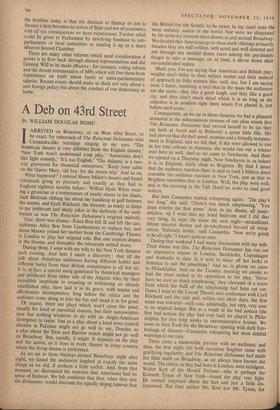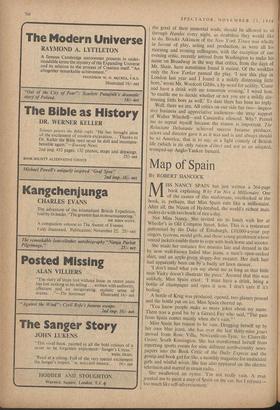A Deb on 43rd Street
BY WILLIAM DOUGLAS HOME IARRIVED on Broadway, or on West 43rd Street. to be exact, for rehearsals 'of The Reluctant Debutante with Cassandra-like warnings ringing in my, ears. 'The American theatre is very different from the English theatre,' `New York won't understand your play,"Americans don't like light comedy,' It's too English,' The Atlantic is a two- way graveyard for theatrical enterprises,' Keep your cabin on the Queen Mary, old boy, for the return trip.' And so on.
What happened? I entered Henry Miller's theatre and found rehearsals going as precisely and exactly as they had in England eighteen months before : Wilfrid Hyde White wear- ing a greatcoat in a temperature of nearly ninety in the shade, Jack Merivale ribbing me about my handicap at golf between the scenes, and Gyril Ritchard, the director, as ready to listen to my irrelevant and shady jokes in the darkness of the audi- torium as was The Reluctant Debutante's original midwife.
True, there was drama—Ednai Best fell ill and left the cast. Adrienne Allen flew from Liechtenstein to replace her, and Anna Massey joined her mother from the Cambridge Theatre in London to play her original role. But one expects drama in the theatre, and thereafter the rehearsals settled down.
During them, I went with my wife to the New York theatres each evening. And here I made a discovery : that all the talk about American audiences having different habiti and different tastes from their British counterparts is all hot air. It is, in fact, a special smog generated by theatrical managers and prOducers from either side of the Atlantic who, by their incredible ineptitude in recasting or redirecting an already established play, have laid it in its grave, with tender and affectionate incompetence, long before the critics and the audience come along to join the fun and tread it in for good.
Of course, there are plays which won't cross the pond, usually for local' or parochial reasons, but their unseaworthi- ness has nothing whatever to do with an Anglo-American divergence in tastes. Just as a play about a local town council election in Pakistan might not go well in, say, Dundee, so a play about the Eton and Harrow match might not go well on Broadway. But, equally, it' might. It depends on the play and the actors, as it does in every theatre in every country where the living drama is performed.
As we sat in these theatres around Broadway, night after night, we' found the audiences laughed at exactly the same things as we did, if perhaps a little earlier. And, from that moment, we discounted the rumours that Americans had no sense of humour. We felt confident that they, when they saw the Debutante, would discount the equally strgng rumour that the British (or the Scotch, to be exact, in my case) were the most unfunny nation in the world. Nor were we disquieted by the tendency towards stern drama in and around Broadway. We decided that Americans go to these stark offerings primarily becadse they are well written, well acted and well directed and not through any morbid desire (save among the psychiatric fringe) to take a message, or, at least, a shiver down their air-conditioned spines.
Mark you, I'm not saying that American and British play- wrights don't differ in their subject matter and their method of approach to little matters like, well, sex, but I am saying (and, I fancy, repeating it too) that in the mass the audiences are the same—they like a good laugh, and they like a good cry, and they don't much mind which it is as long as the adjective is in position right there where I've placed it, just before each noun.
Consequently, as we sat in those theatres, we had a pleasant sensation in the subconscious recesses of our alien minds that The Reluctant Debutante had proved herself to be (as they say both at Ascot and at Belmont) a game little filly. She had proved that she had speed, stamina and a friendly tempera- ment in England, and we felt that, if she were allowed to run in her true colours in America, she would run out a winner over here as well. And so we came to Newhaven. And there we opeded on a Thursday night. Now Newhaven is, as indeed it is in England, fairly close to Brighton. By that I mean that the audience reaction there, is said to (and I believe does) resemble the audience reaction in New York, just as that in Brighton resembles that in London. Well, the play went well: and in the morning in the Taft Hotel we woke to read good notices.
But here Cassandra started whispering again : 'The play's too long,' she said. 'There's too much telephoning,' You must rewrite the first scene.' And, to my shame, all panic- stricken, up I went into my hotel bedroom and I did that very thing. In went the scene the next night—streamlined, fifteen minutes shorter and de-telephoned beyond all recog- nition. 'Infinitely better,' said Cassandra. 'Now we're going to be all right.' I wasn't quite so sure.
During that weekend I had many discussions with my wife. Their theme was this. The Reluctant Debutante has run out an impressive winner in London, Stockholm, Copenhagen and Australia to date. Is it wise to shear off her locks in America to suit the pessimists? And so, in gloom we came to Philadelphia. And on the Tuesday morning we awoke to find the press united in its opposition to the play. `Never have we seen so much telephoning,' they chorused of a scene from which the bulk of the telephoning had been cut out. Down I went to the Locust Theatre into conference with Cyril Ritchard and the cast and, within two short days, the first scene was restored—with cuts, admittedly, but very, very near to its original design. But as a result of the bad notices (the first bad notices the play had ever had) we played in Phila- delphia for two long weeks to unremunerative houses. We Came to New York for the Broadway opening with dark fore- bodings of disaster—Cassandra whispering her most doleful warnings in our ears.
There came a memorable preview with an audience; and then, the first night. On both occasions laughter came with gratifying regularity; and The Reluctant Debutante had made her little mark on Broadway, as we always have known she would. The critics, as they had been in London, were indulgent. Walter Kerr of the Herald Tribune—who is perhaps the Kenneth tynan of New York—found .the play very light. I)e seemed surprised about the fact and just a little dis- appointed. But then neither Mr: Kerr nor Mr. Tynan, for the good of their immortal souls, should be allowed to sit through •Banilet every night, as doubtless they would like to do. Brooks Atkinson of the New York Times was wholly in favour of play, acting and production, as were all his morning and evening colleagues, with the exception of one evening critic, recently arrived from Washington to make his name on Broadway in the way that critics, from the days of Mr. Shaw, have sometimes found it easiest. Of the weeklies only the New Yorker panned the play. 'I saw this play -in London last year and I found it a mildly distressing little bore,' wrote Mr. Woolcott Gibbs, a by-word for acidity: 'Conic and have a drink with me tomorrow evening,' I wired him, 'to enable me to decide whether or not you are a mildly dis- tressing little bore as well.' To date there has been no reply.
Well, there we are. All critics on our side bar two—impres- sivp business and appreciative audiences—the stray support of Walter Winchell—and Cassandra. silenced. Why? Permit me to repeat myself because the reason is important. The Reluctant Debutante achieved success because prOducer. actors and director gave it as it was and is and always should he to America; that is to say, as a light comedy of British life (which is its only raison d'etre) and not as an adapted. trumped-up Anglo-Yankee bastard.











































































 Previous page
Previous page